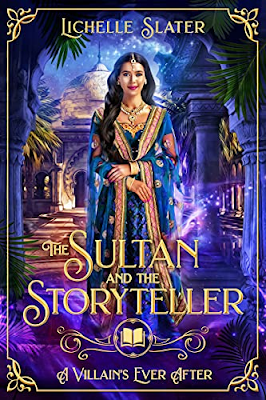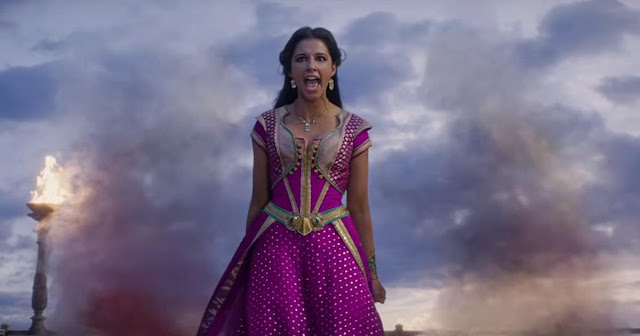Review: The Sultan and the Storyteller
In honor of National Tell a Fairy Tale Day last weekend, all of the books from the Villain's Ever After series went on sale, so I decided to add one more to my collection. The Sultan and the Storyteller by Lichelle Slater caught my eye because instead of doing the obvious choice of reimaging "Aladdin," it is an adaptation of One Thousand and One Nights, a myth that rarely gets much attention. Lichelle Slater's previous books were just okay for me, so I wasn't too sure what to expect from this one. Still, I was eager to read something new. I found it adequate, but not as enjoyable as some of the other books in this series, considering that they are all written by different authors.
In this rare adaptation of One Thousand One Nights, the role of Shahrazad is taken by a young lady named Shahira, who has the unique ability to prophesize the future by speaking it out loud in the form of a story. Such a powerful ability could allow her to change the world in a single night, but she rarely uses it due to a traumatic experience from her childhood that resulted in her mother's death. Shahira lives in a kingdom ruled by a sultan who takes on a new wife every night only for her to die the next morning. It is Shahira's desire to end this senseless string of murders, which made me wonder why she never took advantage of her powers by telling a story about the sultan's wives living long and prosperous lives. Instead, she chooses to sacrifice herself in order to save her friend, Jade, who was selected as the sultan's next victim. This Hunger Games-inspired tactic leads to a series of revelations about Shahira's past that she could never have imagined in her stories.
The custom for this series is to take a classic villain and reveal that they were simply misunderstood, a tradition that was first made popular with Gregory Maguire's Wicked: The Life and Times of the Wicked Witch of the West. The sultan who killed his wives in One Thousand and One Nights is not exactly an infamous villain among fairy tale lore, but his actions are certainly despicable. This book provides an alternative explanation as to why all of his wives died until he met the storyteller. In this version, the true villain is Shahira's father, who is a cookie-cutter copy of Jafar from "Aladdin," which is one of the stories that Shahrazad told in the original One Thousand and One Nights. He is a Grand Vizier with a magic staff, so it's pretty easy to connect the dots from there.
This book presents itself as somewhat of a romance, but I have to admit I wasn't really feeling it. There are lots of defenses against the Stockholm Syndrome theory for "Beauty and the Beast," and I feel like it's a lot harder to argue against that theory with this story. At least Belle didn't agree to marry the Beast until she fell in love with him. Shahira marries Zayne within the first few chapters of The Sultan and the Storyteller despite believing that he killed his wives. Even when she learns the secrets of their pasts and the truth behind the mysteries, it doesn't feel enough to justify the love between a husband and wife. It's almost as though Shahira decided to stay with Zayne because it was easier than trying to get out of the marriage once she realized that she wasn't going to suffer the same fate as his other wives. She even had someone else she was in love with, but she had to give him up to save her friend.
Overall, The Sultan and the Storyteller is just fine for what it is, but it is certainly not the best book in the Villain's Ever After series. It was interesting to read an adaptation of One Thousand and One Nights and even more interesting that the author intends to expand it into a longer series with a preview for an upcoming sequel at the end. However, the book has too many plotholes for me, and I didn't find the characters all that interesting. For someone who could literally change the world with a single story, Shahira still doesn't use her powers to save the lives that came before her. Even when she decided to give in and use them, it doesn't feel like the powerful magic that you usually see in the climax of a fairy tale. This is the most underwhelming story I've read so far in A Villain's Ever After.












Comments